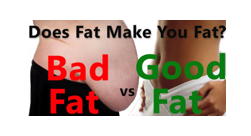I may be dating myself here, but in my twenties, I frequently heard “if you eat fat, you will become fat!”. So, I bought everything “Fat Free” or “Low fat” that I could find. I remember gleefully eating Tootsie Rolls thinking, “Hey, I AM eating healthy!”. Oh … how far I have come! The thought was re-introduced over Thanksgiving when my mom said she recently purchased the “healthy fat free creamer”.
Fat is an essential part of the diet that must be consumed to reap the benefits. Good fats help absorb vitamins, improve satiety (feeling full), supply the body with energy, maintain hair and skin, and are essential for healthy cellular and brain function. Always make sure to read and compare nutrition labels. Many products that are fat-free or low-fat have added sugar to improve taste. Let’s learn more!
- Bad (REALLY BAD) fats are Trans fats! Trans fats have absolutely NO known health benefits. There is NO safe levels of consumption. Trans fats are often found in processed foods to extend shelf life, and in solid margarines and vegetable shortenings. Trans fats are so bad for you that they are officially banned in the US. Trans fats increase LDL, decrease HDL, increase inflammation, are linked to heart disease, stroke, diabetes, and many other chronic diseases. Here is the key: Although banned, they are still found in small amounts in processed foods today. Look for the word “partially hydrogenated oils” on the ingredient list and then get rid of or do not purchase any of those items! There are also many fast food chains that still cook with partially hydrogenated oils to make fries, biscuits, fried chicken, and other fried foods. Check the ingredient list ahead of time!
- Saturated fats are solid at room temperature and are those fats found in red meat, whole milk, dairy products, cheese, coconut oil, and many commercially prepared baked goods. Science has proven that they can raise your LDL and put you at higher risk for heart disease, so most recommendations focus on keeping saturated fats to under 10% of your calories per day. But there are those who believe that these naturally occurring fats do not pose quite the health threat once originally thought. Some have sighted the high amounts of sugar often paired with saturated fat as the true culprit. The take-away is: if you have high cholesterol, reducing saturated fat may help reduce your risk for heart disease.
- Good monounsaturated and polyunsaturated fats come mainly from vegetables, nuts, seeds and fish. They are liquid at room temperature and include olive, peanut, canola, avocado, and sunflower oils. Good sources of Omega 3 fats include salmon, mackerel, sardines, flax seeds, and walnuts. The dietary intake is 20 – 35% of total calories or 44 grams to 77 grams of fat per day for a 2,000-calorie diet. The health benefits of these fats go on and on! From reducing blood pressure, lowering triglycerides, helping with rheumatoid arthritis, reducing risk of dementia, blood sugar control, optimal nerve & brain function to protecting from heart disease & stroke there is no doubt that these are healthy fats!

